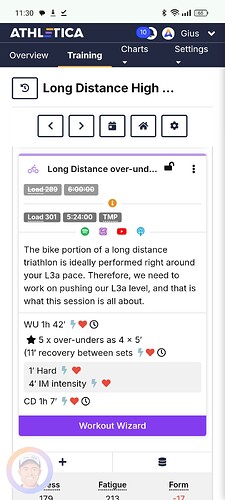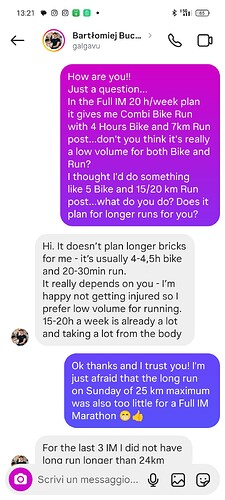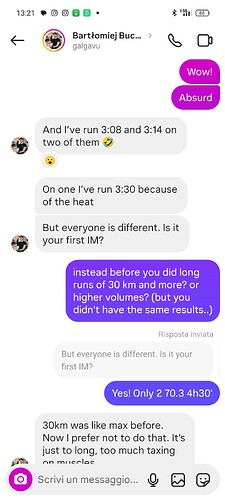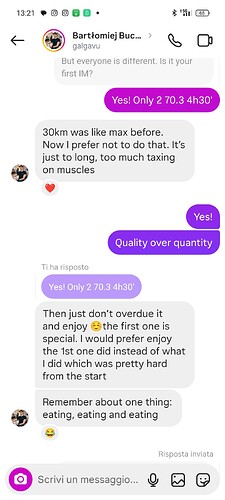Hi Athletes!
For most of use not doing race simulations is a major limitation of ATHLETICA…
For example, there are no open water sessions with 3x1000m repeats.
There are no 2-hour/30km long runs (not even in the Marathon Plan).
There are no long bike rides over 5 hours.
Is this right? I couldn’t say because I haven’t done my first triathlon yet.![]()
In my marathon, I extended the planned runs from 28km to 34km…and I managed it very well. Now I’m doing open water with 3x900m/1000m repeats, and I think they’re essential! In any case, the Plan adapts to these changes, so follow what you think is right for you!
What do you think?
Hello @Giuseppe85
Thanks for your feedback. This is something we hear often, and we’ve spoken about this several times in the podcast.
Yes, I would personally also love Open Water workouts extending from the last taper week. However, most of our athletes don’t have access to Open Water swimming before few days before the race. BUT, we could have OWS alternatives in our Workout Wizard Modality option. I’ll chat with @Prof and see if we can do that.
When it comes to the length of rides and runs, this is very much athlete history/fitness dependent, as a coach, you know this @Giuseppe85 . It would be unwise to ask an athlete who has only done 2-3hr rides to jump up to 5-7 hr rides without proper lead up. For a runner, going from 20K to 32-34K within few weeks is very risky. We have to consider multiple factors; how long does it take for this individual to recover from a 3hr + run? Does this athlete have several longer 25K + runs under the belt? What else does this athlete have in their training plan? What is the recovery status? Does this person have niggles or injuries that we need to take into consideration? Is she/he sleeping well, with good HRV trend?
There are honestly so many factors in play here. Knowing a little bit of your background @Giuseppe85 I know you can handle longer runs. But not everyone can do those. Or should do those longer runs. Especially if it means they can’t back it up with a training session the next day.
Biking is a little more “forgiving” from neuromuscular fatigue perspective, and triathletes especially can heavily lean on building the aerobic base and resilience with biking instead of long stand-alone running.
Remember, that if you slightly increase length of your rides and runs over few weeks, AI Coach sees it and starts to give you a little more duration on those longer rides. This is about individualization, not forcing everyone into a standard mold (that may or may not work - and leave athletes injured or ill).
Our principle is to get our athletes to the start line healthy, fit, ready to burst into a great performance.
For Ironman Triathlon, (I did two last year) I altered the plan slightly. Instead of doing hero long runs or rides and then not being able to do anything for days, I created “mini IM weekends” where I over few weeks build up the length of Swim (Friday), Bricks (Saturday) and long runs (Sunday) to mirror race day demands. Then I would recover with shorter sessions for few days, paying close attention to my recovery status. Those weekends were not that hard that I could not back them up during the week, but they definitely build resiliency to withstand long sessions over several days (3days). Because you can’t do an Ironman before you do an Ironman, those weekends served as mini-training camps for me to get the hours in, and confidence built. My longest run was 28K in prep for IMWC.
As a coach, my biggest fear is that when athletes want to do long runs, they risk of getting sick/injured thus missing many sessions. We can’t forget that if an athlete has been successful following the plan without too many breaks, she/he is carrying quite a bit of fatigue, and pushing to run a very long run can tip the cup over. My two cents.
MJ
Hi Marjaana! I completely agree with you! I would never dream of having one of my athletes do a 5-hour bike ride if they’ve done a maximum of 3 hours.
However, two months before Ironman, I think it’s essential to test mental and physical endurance in workouts as similar as possible to Race Pace.
Personally, I increase Saturday’s Brick with a 1-hour Aerobic Bike ride followed by a 1.5-hour Run Z2. On Sunday, instead of the Long Run, I do 3x 1000m Swim in Z3.
I don’t think this creates any risk of injury. In fact, given ATHLETICA’s ability to adapt to our changes in volume or intensity, starting Monday we may have Overtraining Alerts to follow; otherwise, we can continue with our Planned training. ![]()
During my preparation for the 70.3, I extended my Post-Bike runs with EXCELLENT results and did a Long Swim the next day. On Monday recovery ride and GYM. In the marathon 3 times I did 28/32/34 km in the last 2 months and canceled the race the next day.
Of course, you’re right to be afraid, and I was too (along with my students…) and that’s why I wrote the post!
However, I can tell you that most people fail due to a lack of progressive load and get injured due to an increase in acute load (like Long Run or Long Brick!)
Think about when we study:
We read 5-10 pages a day, then maybe 20 one day, but the next day we’re exhausted… the body works like this, even in sports, so I’d say it’s better to provide constant stimulation over the days, working increasingly on tired muscles and a tired mind, adapting slowly rather than creating dangerous peaks in volume and/or intensity.
What I did was increase my aerobic volume sessions but remain attentive to the AI’s overtraining signals!
Don’t worry, you’ll be mentally strong during the race, and physically, you’ll be ready!
Just getting to an Ironman without injuries is a lot!
I believe and hope you’ll get an answer soon. However, if it can reassure you, there are people who finish Ironman in 9.5 hours or 70.3 in 4 hours by precisely following the ATHLETICA plans without using Workout Wizard.
Trust me…arriving injury-free is your goal! Now compete and then draw your own conclusions.
I’ve reached 6-hour sessions, but I’ve been following the IM program for a year! How long have you been following it?
What were your bike loads before? I set the Fast Ramp, and that helps. In addition to HIGH VOLUME 30H WEEKLY, this doesn’t limit the app, which can increase the loads.
Did you have Medium or High Volume?



